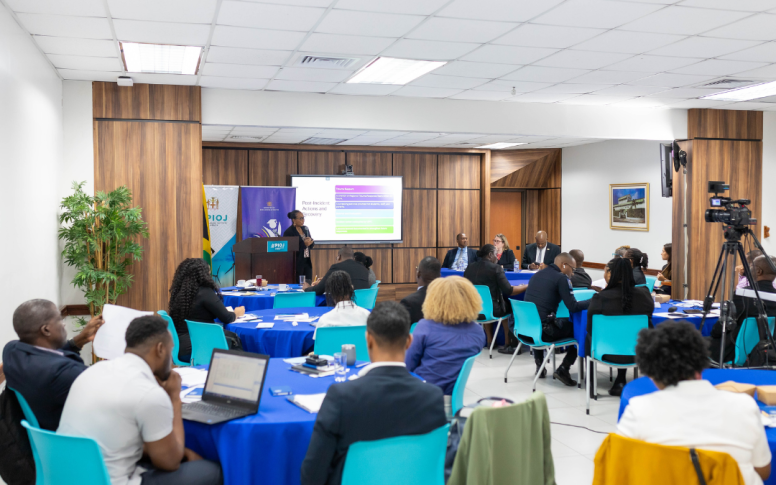Kingston/Jamaica, 12 March 2025 – In a significant step towards improving school safety in Jamaica, representatives from national institutions and organizations gathered at the Planning Institute of Jamaica for a National Stakeholder’s Forum. The forum is a key step in the development of the “National Schools Firearms Management and Response Protocol: A Comprehensive Guide to Preventing, Managing, and Responding to Firearm-Related Incidents in Schools,” an initiative jointly led by Jamaica’s Ministry of Education, Skills, Youth and Information (MOESYI) with the United Nations Regional Centre for Peace, Disarmament and Development in Latin America and the Caribbean (UNLIREC).
The primary purpose of the National Stakeholders’ Forum was to gather valuable feedback on the first draft of the Protocol, which aims to provide a national framework for preventing, managing, and responding to incidents involving firearms in educational settings across Jamaica.
A total of 36 representatives – including 20 women – participated in the forum, representing a broad spectrum of national institutions. These included the MOESYI, the Ministry of National Security, the Planning Institute of Jamaica, the National Parenting Support Commission, the Jamaica Constabulary Force (JCF), the Jamaica Association of Guidance Counsellors in Education (JAGCE) and the Jamaican Psychological Society, among others.
The Protocol is being developed as part of the Saving Lives Entity (SALIENT) initiative in Jamaica, which seeks to tackle armed violence and illicit small arms within a broader framework of people-centred security and sustainable development.
A Collaborative Effort
In the months ahead, MOESYI and UNLIREC will continue to work closely with these stakeholders to refine the Protocol, incorporating feedback from senior leadership. The aim is to finalize the document for formal adoption and ensure its implementation across Jamaica’s education system.
The development of the Protocol follows the 2023 Guidelines for the Development of Protocols to Tackle the Presence and Use of Firearms in Schools. Over the course of 2024 and into 2025, UNLIREC, in partnership with MOESYI, facilitated a series of consultations with key national stakeholders, offering expert guidance throughout the process and supported in the establishment of a multistakeholder technical working group to oversee and guide the drafting of the Protocol.
The Protocol is designed to improve coordination, institutional responses, and preventive measures at all levels of Jamaica’s education system, ensuring a safer and more supportive environment for students and educators alike.

The Protocol’s Objectives: A Comprehensive Guide for Prevention, Management, and Response
The “National Schools Firearms Management and Response Protocol: A Comprehensive Guide to Preventing, Managing, and Responding to Firearm-Related Incidents in Schools” serves as a detailed framework for addressing firearm-related incidents within educational institutions across Jamaica. Aligned with international best practices, national legislation, and established school safety policies, this Protocol outlines standardized procedures to ensure the safety and security of students, staff, and school communities.
In light of the increasing prevalence of firearm-related incidents in Jamaica and the broader Caribbean region, this Protocol aims to equip school administrators, teachers, and security personnel with structured intervention strategies to prevent firearm threats, de-escalate crises, and support post-incident recovery efforts.
The specific objectives of the Protocol include:
- Establishing Clear and Effective Response Mechanisms. Providing structured, standardized procedures for effectively managing firearm-related incidents in schools.
- Strengthening Preventative and Risk Reduction Measures. Implementing early detection mechanisms and enhanced security protocols to prevent the presence and misuse of firearms within schools.
- Enhancing Stakeholders Coordination. Establishing reporting mechanisms, crisis communication strategies, and fostering collaborative partnerships across different sectors to improve overall response efforts.
- Addressing the Psychological and Social Impact of Firearm Incidents: Prioritizing post-incident recovery strategies, including access to counselling, trauma-informed care training for teachers, peer support initiatives, and reintegration programmes for affected students.
- Promoting a Culture of Non-Violence and Conflict Resolution: Beyond immediate response and prevention, the Protocol seeks to reduce the normalisation of violence and improve overall school safety by fostering a culture of peace, non-violence, and responsible conflict resolution within school communities.

